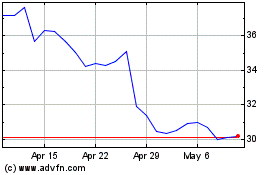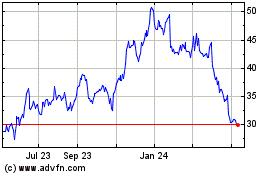Qualcomm Suffers Setback in Antitrust Battle
November 06 2018 - 7:43PM
Dow Jones News
By Brent Kendall and Tripp Mickle
A federal judge dealt a setback Tuesday to Qualcomm Inc.'s
defense against an antitrust lawsuit brought by the Federal Trade
Commission, ruling that the chip maker must license some of its
industry-essential patents to rival chip suppliers.
The ruling Tuesday by U.S. District Judge Lucy Koh in San Jose,
Calif., poses a threat to the Qualcomm's business model, analysts
said. Its technology is widely used in smartphones, but the San
Diego-based company hasn't licensed patents for that technology to
chip-making rivals like Intel Corp. Instead, it has included
licenses only for manufacturers or device makers, charging a
percentage of the price of a smartphone.
When Qualcomm's intellectual property was incorporated into
cellular communications standards, the company made commitments to
standard-setting organizations that it would make its relevant
patents available for use. Qualcomm has argued that the agreements
didn't require it to license technology to rivals.
Judge Koh rejected that argument. She said court precedent
established that Qualcomm's commitments "include an obligation to
license to all comers, including competing modem chip suppliers."
And those licenses have to be offered on fair and reasonable terms,
the judge said.
"This is a game-changer for the industry," said Florian Mueller,
an intellectual-property analyst who studies patent litigation.
Qualcomm historically has licensed patents by charging device
makers a percentage of the sales price up to $400 on handsets. The
ruling means that it could only assess fees based on the $15 to $20
cost of modem chips in the future, Mr. Mueller said.
Qualcomm didn't immediately provide comment. The FTC declined to
comment.
The decision could indirectly benefit Apple Inc., which filed a
lawsuit in January 2017 alleging the chip supplier demanded unfair
terms for patents and required manufacturers license its patents to
get Qualcomm chips. This year, Apple dropped Qualcomm as a supplier
of modem chips for its latest lineup of iPhones, relying instead on
chips from Intel.
Apple and Intel declined to comment on the decision.
The FTC-Qualcomm case hasn't yet gone to trial, so is far from
over. But it resolves in the government's favor one of several
important issues in Qualcomm's ongoing legal fight.
The FTC sued Qualcomm in early 2017, alleging the company
engaged in unlawful tactics to maintain a monopoly on baseband
processors used in cellphones. The commission made several
allegations, some of which weren't a subject of Tuesday's ruling.
The trial is set to begin in January, though the FTC and Qualcomm
have engaged in settlement negotiations. The two sides had asked
Judge Koh to hold off on issuing her ruling while they continued
those talks, but the judge declined. Her ruling potentially could
give more leverage to the FTC.
The FTC and Apple complaints have weighed on Qualcomm. After
filing suit, Apple and Huawei Technologies Co., a Chinese
smartphone maker, began withholding payments for royalties that
Qualcomm depended on for more than half of its pretax profits.
Qualcomm's shares, which have rebounded in recent months on its
plans to repurchase $30 billion in shares, rose 0.25% to $63.63 on
Tuesday.
RBC Capital Markets analyst Amit Daryanani said he expects
Qualcomm to appeal the case. He said that a future settlement of
the FTC case "could signal start of resolution" in its dispute with
Apple, as well.
Qualcomm reports third quarter results on Wednesday and will
likely address the FTC decision during a call with analysts, who
expect the company to explain its implications.
Write to Brent Kendall at brent.kendall@wsj.com and Tripp Mickle
at Tripp.Mickle@wsj.com
(END) Dow Jones Newswires
November 06, 2018 19:28 ET (00:28 GMT)
Copyright (c) 2018 Dow Jones & Company, Inc.
Intel (NASDAQ:INTC)
Historical Stock Chart
From Mar 2024 to Apr 2024

Intel (NASDAQ:INTC)
Historical Stock Chart
From Apr 2023 to Apr 2024
